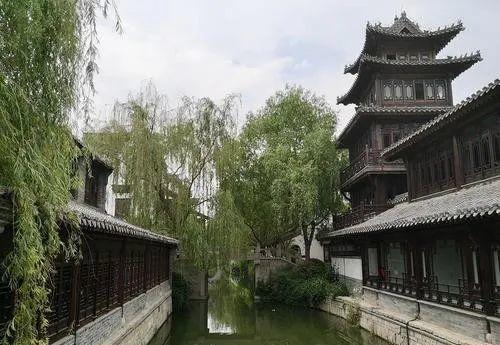Reading a good poem is like tasting a cup of sweetness, which is not only pleasant, but also endlessly aftertaste. And those excellent works that have been passed down for a long time not only embody the painstaking efforts of the poet, but also use various expression techniques. Poetry often uses rhetorical techniques such as metaphor and anthropomorphism, but there are also some techniques that are not familiar to readers, such as anti-fall techniques.
The so-called reverse fall, that is, away from the above writing direction, suddenly turned in the opposite direction, in fact, the so-called opposite, the final result is not only thought-provoking, but also quite stimulating the reader's reading interest. The following introduces Liu Changqing's superb seven laws, using anti-fall techniques, delicate and vivid, worthy of the Middle Tang Dynasty talent.

Dengyugangu County
Tang Dynasty: Liu Changqing
The lonely city is in line with the white clouds, and the ancient desolation is desolate and the water is west.
The official building was empty, and the female wall was still crying in the night.
The flat sand is vague and charming, and the sunset pavilion is low to the guests.
The birds did not know the change of the valley, and went to Yiyang Creek in the twilight.
Liu Changqing is a poet of the Middle and Tang Dynasties, he has experienced ups and downs, read countless people, coupled with his excellent poetry skills, so that many of his works are popular with readers. This poem was written in the author's degraded career, when he passed by Poyang, climbed the tower to look out, saw a lot of abandoned and desolate scenery, and felt a thousand emotions, so he gave a poem to commemorate it.
The poem begins with a large scene with towering towers towering majestically. The author ascends to the isolated city, looks into the distance, and feels that the place is desolate. The river in the east of the city flows day and night, and also witnesses the vicissitudes of this ancient city.
The author uses a "Qi" character to exaggerate the height of the city tower; and uses the word "Wangu" to explain its history. The poet stood there, feeling extremely small, and even more sad that life was so short.
The poet carefully observed the surrounding scenery and felt even more desolate. The official buildings of the past have long been empty, but they are full of wild grass and basil; the walls of the ancient buildings are still intact, and the birds can be heard here at night.
In order to express its desolate characteristics, the author describes two typical images, "autumn grass and crowing", showing the uninhabited people here from both audiovisual and audiovisual aspects. The author actually just happened to see the birds roosting here, but imagined that they would keep chirping at night, as if they also felt a kind of loneliness.
The poet again casts his gaze outside the city and expresses his inner feelings. The endless stretch of flat sand continues to extend into the distance, giving people speculation that thousands of years ago, there may have been thousands of acres of fertile land here. As the sun sets, it seems to bow its head in front of its guests, as if it had done something wrong.
"Flat sand is small, sunset pavilion", reading harmoniously, but also vividly depicts the distance and confusion of the vision, let people feel the changes in the vicissitudes of the sea and the mulberry fields, but also express the eternity of the sun, moon and stars, and the strong contrast between life and life is only a drop in the ocean.
However, the poet's cleverness lies in the fact that he does not see a single sad word in the whole text, but he conveys his own sorrow in the description of the scene. The tail link is especially thought-provoking, "The birds do not know the change of the valley, and go to Yiyang Creek in the twilight." "The birds are ruthless, unaware of the great changes in the mountains and rivers of the Linggu Valley, but still soar freely on the banks of the Yiyang River.
The word "do not know" seems to blame the insensitivity of the bird, but it is actually just an unreasonable remark, which also reflects that the author has carefully noticed the magic of nature, and laments that as an ordinary man, he is unable to change the inherent law of the operation of all things.
Liu Changqing's Seven Laws is lyrical and delicate. The author first presents a panorama, and then the brushstrokes begin to turn to the city, highlighting the bleak atmosphere of autumn grass and crows. Then the poet turned to describing the "flat sand and sunset" outside the city, giving people a confused and bleak impression. At the end, the anti-fall technique is used, no longer describing the scene inside and outside the city, but using the free flight of birds, revealing the poet's feelings about the rise and fall of the rise and fall.
There are no flowery words in the whole text, nor any allusions and legends, and the author uses pure white painting techniques, but it appears to be ups and downs, which is profoundly felt. The cold of the wilderness, the evening sunshine of the sunset, the crows crying at night, and the merciless birds, all these scenes, seemingly ordinary, but in the poet's heart, little by little, superimposed, but feel extremely heavy and confused!